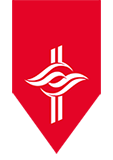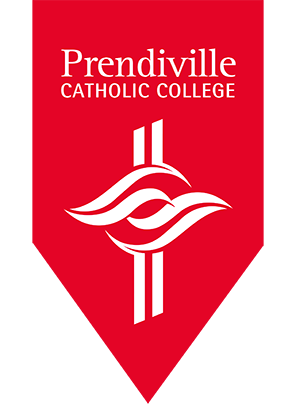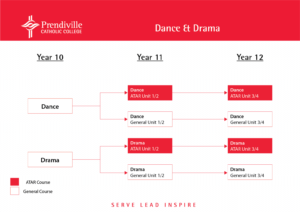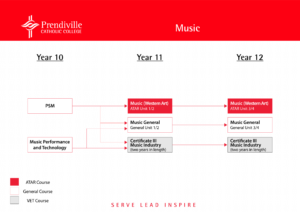- Home »
- Curriculum »
- Year 11 »
- Performing Arts »
Performing Arts

Performing Arts
Year 11
Open the panels below for further details.
Dance (ATAR)
The study of Dance acknowledges the interrelationship between practical and theoretical aspects, the making and performing of movement and the appreciation of its meaning. The ATAR Dance course develops and presents ideas through a variety of genres, styles and forms, as it provides a unique way in which to express our cultural view and understanding of the world. As a physical art form, dance is able to offer an opportunity for students to achieve an elite level of movement skills. They gain an understanding of the physical competencies specific to dance, including experiential anatomy (movement specific alignment), strength, flexibility, coordination and rhythmic understanding, while learning to use the body as a medium for artistic expression. The study of Dance draws on other disciplines, including yoga, martial arts and gymnastics. It is essential that students demonstrate safe dance practices and understand health issues that will enhance their general physical well‐being and prolong their dance involvement.
In performing dance, technical, design and expressive skills are incorporated and developed. The opportunity to present dance to an audience enables students to understand and undertake a wide range of production and design concepts, skills and roles. Dance may draw on other art forms, such as music, art and electronic media to broaden students’ knowledge and interest in the Arts. Through participation in the Dance course, students develop transferable skills essential to their future. These include communication skills, collaborative teamwork skills, negotiation and conflict resolution skills, problem solving skills, as well as the ability to organise, analyse and evaluate. Participation may lead to opportunities for future study in dance or related arts fields.
Unit 1 – Popular Culture
Within the broad focus of popular culture, teachers select learning contexts that relate to the interests of their students and build upon the understandings that they have already acquired.
The exploration of dance in popular culture leads to a wider understanding of the diverse contexts and functions of dance in our society. Students understand and value the way dance is subject to different interpretations, and appreciate that informed responses should take into account the varying contexts within which dance works are created.
Unit 2 – Australian Dance
Within the broad focus of Australian dance, teachers select learning contexts that relate to the interests of their students and build upon the understandings that they have already acquired.
An understanding of the diverse range of functions and contexts of dance in Australia allows students to make relevant comparisons between their own dance and the dance of others. They analyse critically their own cultural beliefs and values in relation to traditional and contemporary dance forms and styles, and develop deeper understandings of their own personal dance heritage. They understand that dance may give form to ideas and issues that concern the wider community.
Course Content: The course is 60% practical (performance/production) and 40% written (response) including written and practical examinations.
Prerequisites: B Grade or above in the completion of the Year 10 Dance course at Prendiville Catholic College, or entry upon audition/interview with the Head of Performing Arts.
English prerequisite: Year 10 English C grade or higher.
Special exemptions apply to new students to Prendiville and individual cases, at the discretion of the Head of Performing Arts. Please speak to Mr Hislop for further information.
Course Requirements: Students are required to have a Prendiville Dance black leotard and black leggings.
Pathway: Units 3 and 4 ATAR Dance in Year 12
Dance (General)
The Dance General course develops and presents ideas through a variety of genres, styles and forms, as it provides a unique way in which to express our cultural view and understanding of the world. Through critical decision-making in individual and group work, movement is manipulated and refined to reflect the choreographer’s intent. Students use a wide range of creative processes, such as improvisation and the use of choreographic elements and devices, and draw on their own physicality and the interpretation of existing work of others to make dance works.
Students experience an intrinsic sense of enjoyment and personal achievement through expressing and challenging themselves physically. As a physical art form, dance is able to offer an opportunity for them to achieve an elite level of movement skills. They gain an understanding of the physical competencies specific to dance, including experiential anatomy (movement specific alignment), strength, flexibility, coordination and rhythmic understanding, while learning to use the body as a medium for artistic expression.
Through participation in the Dance General course, students develop transferable skills essential to their future. These include communication skills, collaborative teamwork skills, negotiation and conflict resolution skills, problem solving skills, as well as the ability to organise, analyse and evaluate. Participation may lead to opportunities for future study in dance or related arts fields.
Unit 1 – Exploring the components of dance
Within the broad focus of exploring the components of dance, teachers select learning contexts that relate to the interests of their students and build upon the understandings that they have already acquired.
The elements of dance and processes of choreography are explored and students solve structured choreographic tasks to produce dance works for performance. They have first-hand experience of
dance-making which actively engages them in exploration, improvisation, research, reflection and response. Technologies and design concepts are introduced to the planning stage of dance creation.
A broad introduction to dance genres enables students to place dance in its time and place and then begin to understand its functions within this context.
Unit 2 – Dance as entertainment
Within the broad focus of dance as entertainment, teachers select learning contexts that relate to the interests of students and build upon the understandings that they have already acquired.
Students explore the entertainment potential of dance and choreography. In practical lessons, they improve safe dance practices and their physical competencies while acquiring genre-specific technique. They explore and experiment with the elements of dance and processes of choreography to solve choreographic tasks for performance.
Students identify and select technologies and design concepts which enhance the entertainment value of the dance and place it in its social, historical and economic context.
Course Content: The course is 70% practical (performance/production) and 30% written (response).
Prerequisite: The study of Year 10 Dance is an advantage but not essential.
Course Requirements: Students are required to have a Prendiville Dance black leotard and black leggings.
Pathway: Units 3 and 4 General Dance in Year 12
Drama (ATAR)
The Drama ATAR course focuses on drama in practice as students integrate their knowledge and skills. They use the elements and conventions of drama to develop and present ideas and explore personal and cultural issues. They engage in drama processes, such as improvisation and text interpretation, which allow them to create drama and interpret a range of texts written or devised by others. Their work in this course includes production and design aspects, such as sets, costumes, props, and sound and lighting. Increasingly, students use technologies, such as digital sound and multimedia. They present drama to a range of audiences and work in different performance settings.
Students work independently and collaboratively, learning self-management skills, showing initiative and demonstrating leadership and interpersonal skills. The Drama ATAR course requires them to develop and practise problem-solving skills through creative and analytical thinking processes. They develop their capacity to respond to, reflect on, and make informed judgements using appropriate terminology and language to describe, analyse, interpret and evaluate drama.
Unit 1 – Realism and Representational Drama (Stanislavski)
This unit focuses on realism and representational drama.
In this unit, students have the opportunity to research and collaboratively workshop, interpret and perform drama texts in forms and styles related to realism and representational drama.
Within the focus of realism and representational drama, students must investigate the approach of Konstantin Stanislavski.
The investigation must include:
- the background
- the ideology
- the application of the approach in rehearsal and/or performance.
Unit 2 – Non-realism and Presentational Drama (Brecht)
This unit focuses on non-realism and presentational drama.
In this unit, students have the opportunity to research and collaboratively workshop, interpret and perform drama texts related to non-realism and presentational drama.
Within the focus of non-realism and presentational drama, students must investigate the approach of Bertolt Brecht.
The investigation must include:
- the background
- the ideology
- the application of the approach in rehearsal and in performance.
Course Content: The course is 50% practical (performance/production) and 50% written (response) including written and practical examinations.
Prerequisite: B Grade or above in the completion of the Year 10 Drama course at Prendiville Catholic College, or entry upon audition/interview with the Head of Performing Arts.
English prerequisite: Year 10 English C grade or higher. A Humanities C grade is also recommended.
Special exemptions apply to new students to Prendiville and individual cases, at the discretion of the Head of Performing Arts. Please speak to Mr Hislop for further information.
Course requirements: Students are required to have a pair of ‘theatre blacks’ for this subject (black pants or shorts and a black t-shirt).
Pathway: Units 3 and 4 ATAR Drama in Year 12.
Drama (General)
Drama is a vibrant and varied art form found in play, storytelling, street theatre, festivals, film, television, interactive games, performance art and theatres. It is one of the oldest art forms and part of our everyday life. Through taking on roles and enacting real and imagined events, performers engage audiences who suspend their disbelief to enter the world of the drama. Through drama, human experience is shared. Drama entertains, informs, communicates and challenges.
Students achieve outcomes through the key activities of creation, performance and reflection. They explore and communicate ideas and learn particular processes and skills to enable them to work with drama forms, styles, conventions and technologies. They reflect, respond and evaluate drama and become critical, informed audiences, understanding drama in the context of their own society and culture, drawing on a diverse range of drama from other cultures, places and times to enrich their intercultural understanding.
The Drama General course focuses on aesthetic understanding and drama in practice as students integrate their knowledge and skills. They use the elements and conventions of drama to develop and present ideas and explore personal and cultural issues. They engage in drama processes, such as improvisation, play building, text interpretation, playwriting and dramaturgy which allow them to create original drama and interpret a range of texts written or devised by others. Their work in this course includes production and design aspects involving sets, costumes, makeup, props, promotional materials, stage management, front-of-house activities, and sound and lighting. Increasingly, students use technologies, such as digital sound and multimedia. They present drama to a range of audiences and work in different performance settings.
Unit 1 – Dramatic storytelling
The focus of this unit is dramatic storytelling. Students engage with the skills, techniques, processes and conventions of dramatic storytelling. Students view, read and explore relevant drama works and texts using scripts and/or script excerpts from Australian and/or world sources.
Unit 2 – Drama performance events
The focus for this unit is drama performance events for an audience other than their class members. In participating in a drama performance event, students work independently and in teams. They apply the creative process of devising and of interpreting Australian and/or world sources to produce drama that is collaborative and makes meaning.
Course Content: The course is 70% practical (performance/production) and 30% written (response).
Prerequisite: The study of Year 10 Drama is an advantage but not essential.
Course requirements: Students are required to have a pair of ‘theatre blacks’ for this subject (black pants or shorts and a black t-shirt).
Pathway: Units 3 and 4 General Drama in Year 12.
Music (ATAR)
Music is a universal expression of human experience. It reflects the development of culture and identity in all societies throughout history. Music has an incredible capacity to inspire and elicit an emotional response through listening and performing and provides opportunities for creative and personal expression. Through the practical study of Music, both individually and with others, students grow in confidence as musicians by engaging in opportunities to perform, compose, analyse and develop music literacy.
Students demonstrate critical and creative thinking, self-regulation, collaboration, reflective practice, resilience and perseverance that are integral to the development of holistic musicians. As empathetic, independent learners, students seek life-long engagement and enjoyment through the pursuit of music, be it personal, social, cultural and/or vocational.
Aims
The Music ATAR course aims to develop students’ skills in:
- Performance – students apply technical facility, stylistic and expressive awareness and knowledge of conventions when performing, both as a soloist and in ensemble
- Composition – students use creativity when applying music language, stylistic conventions and knowledge of instrumental and performance techniques when composing and arranging
- Music literacy – students develop their ability to read and write music, analysing, and aurally identifying, the elements and characteristics of music
- Music analysis – students analyse and understand ways in which the elements and characteristics of music have been applied across time, place and culture.
Unit 1 – Elements of Music
Students engage in music making as performers and/or composers, both individually and collaboratively. They develop their music literacy, learning how the elements and characteristics of music can be applied, combined and manipulated when performing, composing, listening to and analysing music.
The music analysis theme for this unit is Elements. What are the building blocks that make music work? Students respond to music as they explore the creative application of music elements across time, place and culture. They gain greater familiarity with how and why music is created, by engaging with a range of designated works, developing their understanding and use of music elements.
Designated Works
Haydn, J. Trumpet Concert in Eb Major. 3rd movement
Armstrong, L. West End Blues
The Shirelles Will You Love Me Tomorrow?
Unit 2 – Narratives
Students confidently engage in music making as performers and/or composers, both individually and collaboratively. They continue to develop and consolidate their music literacy, learning how the elements and characteristics of music can be applied, combined and manipulated when performing, composing, listening to and analysing music.
The music analysis theme for this unit is Narratives. How can music tell a story? Students understand that music elements can be manipulated to expressively communicate narrative. Through the combination of music and narrative, composers can provoke strong emotional responses from audiences. This unit aims to develop a more sophisticated understanding of how music elements have been manipulated for specific storytelling purposes.
Designated Works
Smetana, B. Die Moldau
Ellington/Fitzgerald Take the A Train
The Beatles A Day in the Life
Prerequisite: Year 10 Prendiville Specialised Music (PSM) B grade or higher and working at AMEB performance Grade 4 or above. Students are required to have their instrumental tutor sign off on their ability to perform at an ATAR level and have an interview with the Head of Performing Arts.
English prerequisite: Year 10 English C grade or higher.
Special exemptions apply to new students to Prendiville and individual cases, at the discretion of the Head of Performing Arts. Please speak to Mr Hislop for further information.
Course requirements: Students must be enrolled in individual tuition (30 minutes or 45 minutes) within the college or externally for the duration of the year on their principal study instrument/voice. Ongoing rehearsals and performances with a professional accompanist throughout the year also incur additional fees.
Pathway: Units 3 and 4 ATAR Music in Year 12
Music General
The General Music course is designed to accommodate those students who have a keen interest in music and have some formal training in instrumental or vocal studies.
Music is an aural art form that involves the exploration, organisation and manipulation of sound and silence. Music has the capacity to engage, inspire and enrich students, stimulating imaginative and innovative responses and fostering critical thinking and aesthetic understanding. Music is processed through aural discrimination, memory and emotional response, all of which interact with each other and with physical processes as a means of perceiving, learning, composing and performing.
Students listen, perform, improvise, compose and analyse music, developing skills to confidently engage with a diverse array of musical experiences both independently and collaboratively. Through continuous sequential music learning, students develop music knowledge, skills and understanding to create, communicate and evaluate music ideas with increasing depth and complexity. Students are encouraged to reach their creative and expressive potential, communicating ideas with current and emerging technologies.
Music is an expression of human experience and has a universal place in every culture across the globe and throughout history. Studying music provides the basis for significant lifelong engagement and enjoyment, and fosters understanding and respect for all music and music practices across different times, places, cultures and contexts.
Unit 1 – Rock Music
Students study the development of Rock Music from it’s foundations of Jazz, Blues, and Country. They will analyse both visually and aurally a range of different songs from the 1950s through to present day and study sub-genres such as Surf Rock, Progressive Rock, Heavy Metal, Punk, and Grunge.
Unit 2 – Film Music
In this unit, students study Film Music, looking at the development of this genre over a variety of eras. Students develop skills in the analysis of the music used in films, and develop an understanding of its function and purpose. Students develop historical knowledge and high-level analysis skills whilst looking at this genre, studying the use of music in films such as The Good, The Bad, and The Ugly, Star Wars, Lord of the Rings, and Interstellar.
The course is 40% practical (performance or composition portfolio) and 60% written (aural and theory, investigation and analysis, and composition and arranging).
Prerequisite: The study of Year 10 Prendiville Specialised Music (PSM) is an advantage but not a requirement. Students must be working at AMEB performance Grade 2 or above and be willing to engage with both the practical and theoretical content of the course.
Special exemptions apply to new students to Prendiville and individual cases, at the discretion of the Head of Performing Arts. Please speak to Mr Hislop for further information.
Course requirements: Students are recommended to be receiving tuition on an approved instrument or be receiving composition lessons.
Pathway: Units 3 and 4 General Music in Year 12
Certificate III Music Industry | Part One
The Music VET standalone course focuses on the areas of performance, ensemble and band skills, sound recording, editing and mixing in a hands-on and practical environment.
The VET Music course makes prime use of our industry-standard recording studio, 300-seat theatre, Music Technology Mac Lab and purpose-built control room, all fitted with a complete package of industry-standard recording and sound equipment and ProTools software. All students in this course are trained in the use of the recording studio, relevant equipment and software, and once trained to a sufficient level, may choose to book the studio out of class time to engineer their own recording.
Students may choose from two streams within this course – performance or technology, and may complete a number of competencies in their choice of a Contemporary, Classical, Jazz or Musical Theatre context.
This course is run in two parts and provides students with the opportunity to complete a full Certificate III over Year 11 and 12, providing them with a recognised industry qualification as well as a credit of 6 units towards their WACE. A Certificate III will provide students with credit towards WAAPA entry into the Diploma and Advanced Diploma courses (Music Performance or Audio Engineering), SAE (School of Audio Engineering) or another area of study.
Our College partners with Cosamp, a registered training organisation for the Certificate III in Music. Students selecting this course will be enrolled with this RTO and inducted into their requirements at the beginning of Year 11.
Whilst this is predominantly a practical class, written components will be required. These must be completed in full and to a high standard in order to meet the requirements of the course.
Cost: There is an additional cost of $250 to cover the VET auspicing and workshop fees.
Prerequisite: Nil. The study of the Year 10 Prendiville Specialised Music (PSM) or Year 10 Music Performance and Technology (PTech) is an advantage but not essential. Some previous instrumental or vocal experience (beginner level acceptable) is required to complete this course.
Pathway: Certificate III Music Industry (Part Two) in Year 12




